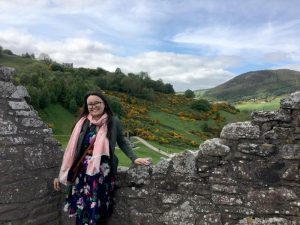Baker and Taylor Scholarships Support Master’s Students through SILS Summer Seminars
July 22, 2017
School of Information and Library Science
With the support of scholarships funded by Baker and Taylor, three University of North Carolina at Chapel Hill School of Information and Library Science (SILS) master’s students gained professional and international insights through three different SILS summer seminars in Europe earlier this year. Mary Kallem traveled to Prague, Jennifer Embree went to London, and Mary Oliva took part in the first SILS seminar in Dublin and Berlin. The Baker and Taylor Scholarships cover the cost of program registration, academic credit and housing, and provide a stipend to defray the cost of travel.
An interest in how everyday information practices relate to performances of citizenship drew Mary Kallem to the Prague seminar. “I was eager to visit the Czech Republic because I saw their discontinuous political history as a fascinating case study.”
Kallem, who’ll begin her second year in the Master of Science in Library Science (MSLS) program this fall, was particularly moved by a visit to Libri Prohibiti, an archival library of samizdat, exile literature, and banned books. The seminar group met with the library’s director, Jiří Gruntorád, who published samizdat (banned by the state) literature during Soviet rule before his arrest and imprisonment.
“It was an incredible institution glowing with object histories, and speaking with Gruntorád vivified histories that otherwise risk laying static within walls of cultural institutions,” Kallem said.
Overall, Kallem said the seminar pushed her to conceptualize librarianship on a global scale and recognize new opportunities for international collaboration. Receiving the scholarship put the summer seminar within her reach. “I’m incredibly thankful for the work done by SILS faculty and staff to maintain an active relationship with Baker and Taylor,” she said. “I’m particularly appreciative of Kaitlyn Murphy’s investment in making the SILS International Program what it is, as well as the encouragement I received from my advisor, Brian Sturm, to apply in the first place.”

International librarianship was a passion for Jennifer Embree even before she began the MSLS program at SILS last fall. The international summer seminar offerings and scholarship support actually played a role in her decision to attend UNC. Embree said she was ecstatic when she learned she had been selected for the Baker and Taylor Scholarship.
“It was such an incredible honor to receive the scholarship and it allowed me to have a truly unforgettable experience in London, meeting British library and information professionals, learning about librarianship as it is studied and practiced in the UK, and touring so many of the world’s most renowned British libraries in person,” she said.
A major highlight of the trip for Embree was a visit to the Kew Gardens, one of the best and most diverse botanical gardens in the world. Embree not only got to enjoy the flora, but also tour Kew’s library and archives and meet the librarians that worked there.
“The librarian guide showed us several old botanical and medicinal manuscripts from the archives, including the oldest book in their collection,” Embree recalled. “She explained the history and the context of each book, and the techniques that were often used to create the most realistic botanical sketches. She then gave us a tour of the entire archive, taking us into the herbarium of the building, where thousands upon thousands of botanical specimens from past and current centuries are housed. I even was able to see plant specimens that Darwin collected on his journey to the Galápagos.”
The London seminar further reinforced Embree’s desire to work in the archives field with materials that have a transnational, multicultural focus, and it sparked a new interest in digital humanities.
“The University of College London, the college that hosts the SILS program, has an incredible digital humanities department within the information school, and multiple people came to talk about the work that they do there,” she said. “Digital humanities had been kind of off my radar before this, but being exposed to it during the seminar, and seeing the types of projects that were being developed completely fascinated me to the point where now I am considering getting the Digital Humanities Graduate Certificate from UNC.”
The chance to gain an international perspective on information practices sparked Mary Oliva’s interest in SILS’ newest seminar, which focuses on the ways information gathering, dissemination, privacy, and security affect business. Oliva, who is in the process of transitioning from the MSLS to the Master of Science in Information Science (MSIS) degree track, wants to focus on providing the infrastructure necessary for communities to be able to fully utilize the digital and information tools that other information scientists are working to improve. To learn how to best facilitate the most useful and effective systems, Oliva is working to gain an understanding of how community needs are different in urban, suburban, and rural settings, and among different cultures. The Dublin/Berlin seminar fit well with this endeavor.

“I want to work with communities outside of the U.S., so I felt that it was important to see the differences in systems in other nations, and whether they were encountering the same or different issues with barriers to access and use, as well as how they approached finding solutions to problems,” she said.
Receiving the Baker and Taylor Scholarship enabled Oliva to extend her trip so she could experience even more of Western Europe, though Berlin was a definite high point in her travels. “I already wanted to move to Germany, and almost everything about the city made me fall more in love.”
Visits to various businesses and organizations in Berlin and Dublin during the seminar afforded Oliva new insights, gained both from the speakers and the other students participating.
“I think a lot about access, and the interests of other attendees reminded me that for systems to truly be accessible, they have to be secure enough to protect the privacy of users.”
